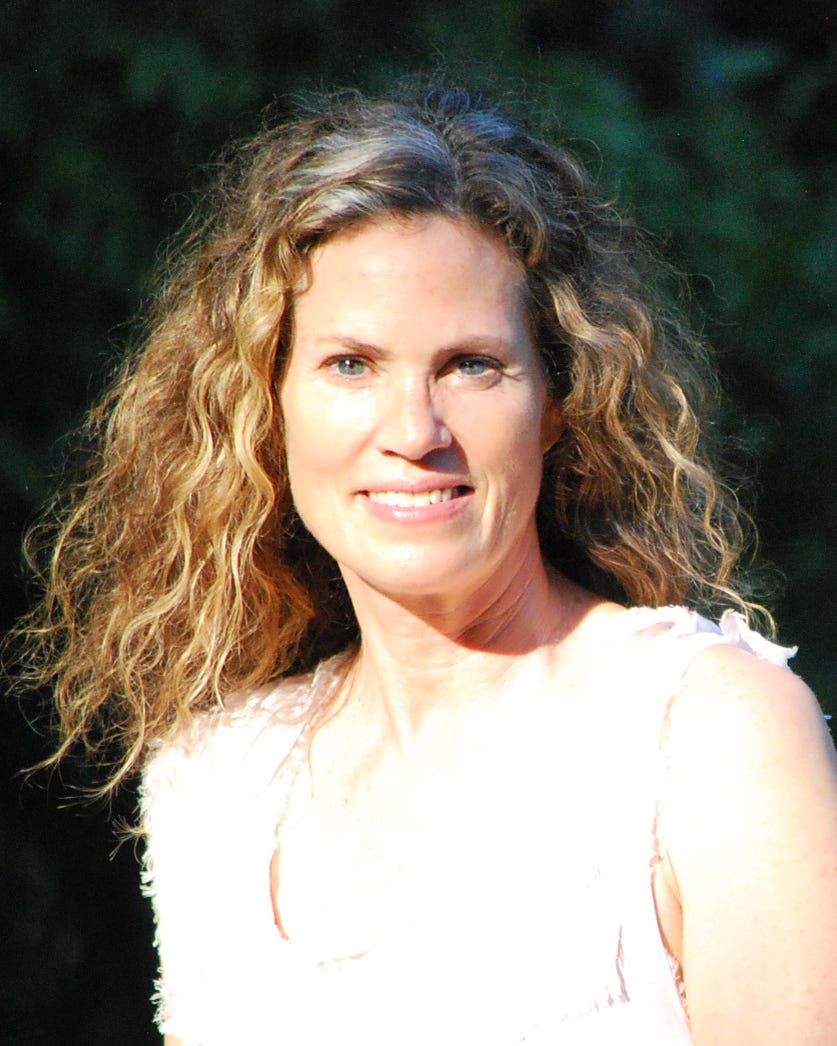My Turn Now
A personal essay by Ashley Collins about grief, aging, and new directions at midlife.

Staring at myself in the mirror of the hair salon was a shock. I felt like I’d been aged for a role, like Kate Winslet in Titanic. It’s been happening a lot lately, me getting surprised by my own reflection. I know it’s just math, but I can’t help wondering how all those years crept up on me so fast.
As the stylist whirled around me, snipping and pulling, I wanted to shut my eyes. Nobody looks good in a black cape without makeup, under bad lighting. But my stylist was so happy with his art, taming my frizzy mass into sleek Farrah Fawcett waves, that I didn’t want to seem ungrateful. To be fair, my hair did look fantastic, but all I could focus on were the years that had layered onto my face. Such a strange sensation, to still feel like my younger self, but see a woman old enough to be a grandmother.
It’s not that I don’t want to be a grandmother. I do, one day, but that day has been theoretical in my imaginings, way off in the distant future. Not now, not when I still picture my mother playing that role for my kids. But she died last year and suddenly, without my consent, I have joined the older generation. I’m disoriented, and in the midst of my grief, I have this fear that stepping into her shoes will mean I have to let her go for real, and I’m not ready.
Not when I can still hear her voice in my head.
Earlier, when I was getting ready for my hair appointment, cursing my way into high-waisted jeans, I could feel my mother laughing over my shoulder. “There’s not a damn thing you can do about it,” she said brightly.
“My stomach? Aging? What?” I huffed, trying to tuck in my new menopausal belly.
“Any of it,” she chuckled. “You might as well accept it.” I hated that I listened to her more carefully now that she was dead.
We had started talking more regularly the few years before she died, often daily. After my father had passed away, I felt a duty to check in, as her health was deteriorating and I lived far away. But I didn’t have any idea how much I would miss the sound of her voice once she was physically gone. How much I would miss making her laugh. Miss her advice, her stories that gave me context for my own challenges. But she’s not here anymore to joke about menopause, or help me bear the devastation of my dog dying, or to remind me that it’s time to stop feeling responsible for my adult children’s happiness.
“It’s not like you ever stopped worrying about us,” I said out loud, still struggling to pull on my jeans. I knew that she never slept well, in the chronic maternal dread of terrible things happening to her children or grandchildren..
“Maybe not,” she responded. “But we also didn’t know every little thing that happened every moment of every day, in full technicolor on our phones, the way you do with your kids today. Ignorance was bliss for stretches of time. We had breaks.”
“I can’t help it, Mom. I don’t know how to unplug from their pain.”
“You have to learn. You’ve always felt things too strongly, ever since you were a little girl.”
“You never told me that,” I said softly, wondering what else she never told me.
“Maybe you weren’t ready to hear it then,” she said.
“That’s fair,” I admitted.
“But you need to listen to me now,” my mother went on, speaking in my mind. “You have done enough for your kids. They’re fully grown adults living their own lives, making their own decisions, and they need to deal with their own consequences.”
“Even when I can see heartbreak coming?”
“Even then,” she said quietly. And then it hit me. She’d let me make the biggest decision of my life without interfering, even though I suspect she knew my heart would break, possibly multiple times, that several hearts might break.
“Mom,” I started, tears filling my eyes. Like it was yesterday, I could see her sitting on the edge of my childhood bed, where I was huddled miserably under the sheets, the day before my wedding.
“Honey, it’s your turn now,” she whispered from the ether. “Let go. It’s time to live your life. The one you want. While you still can.”
I want to take her advice. I’ve longed for a pause in duty and obligation, to focus on myself, to achieve my own goals after raising a family. But losing both my parents has left me anchor-less in a way that I didn’t anticipate. My kids are now young adults, not quite old enough to need me yet again, and I feel abandoned. It’s a mother’s job to prepare her children for the world, to launch them, but I didn’t factor in losing my own mother at the same time.
“It may be my turn, Mom, but I’m stuck,” I whispered back to her.
“You’ll figure it out,” she said, with more confidence than I felt. Because at the moment I was still paralyzed by loss, book-ended by my parents’ deaths and my children forging their own paths, stunned by the sudden sum of years, and barely recognizable to myself in the mirror.
“And this is when my body decided to change??” I cried out in frustration, sweating from the effort of getting dressed.
“That’s life,” my mother said.
Ashley Collins graduated from Stanford University in 1987 with a BA in Anthropology. Her work has appeared online at Huff Post, Grown and Flown, Mothers Always Write, US Equestrian, the Roar Sessions, and published in several anthologies. She currently writes a blog about her family and animals, and is working on a novel. You can read more about her at ashleycollinswriter.com and on social media at facebook.com/ashleycollinswriter and instagram.com/ashleygriffincollins.





This was absolutely beautiful and so relatable! Thank you for sharing.
Your mother was regal, wise and beautiful. You remind me of her so much. Both your parents are missed in our community.